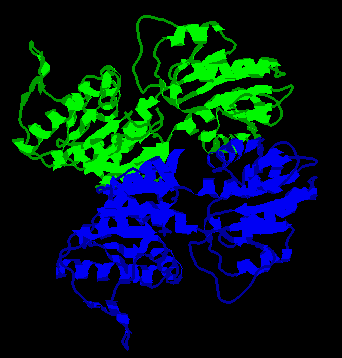 |
 |
 |
Click on the image to start downloading the PDB file (tridimensional and interactive).
Phosphoribosyl pyrophosphate synthetase
Phosphoribosyl diphosphate synthetase
7.Transferring phosphorus-containing groups
6.Diphosphotransferases
dATP
D-Ribose 5-P
dAMP
5-P-a-D-ribose-1-di-P
dATP can also act as donor.
Phosphoribosyl pyrophosphate synthetase catalyzes the formation of PRPP from ATP and ribose 5-phosphate. PRPP is then used in various biosynthetic pathways, as for example in the formation of purines, pyrimidines, histidine and tryptophan. PRPP synthetase requires inorganic phosphate and magnesium ions for its stability and activity.
In mammals, three isozymes of PRPP synthetase are found; in yeast there are at least four isozymes.
As a signature pattern for this enzyme, it has been selected a very conserved region
that has been suggested to be involved in binding divalent cations. This
region contains two conserved aspartic acid residues as well as a histidine,
which are all potential ligands for a cation such as magnesium.
Reference